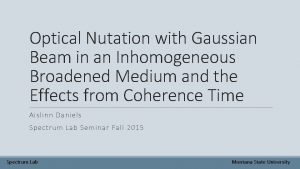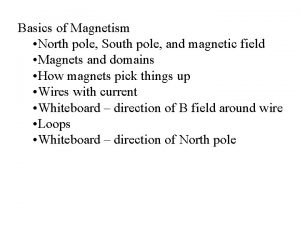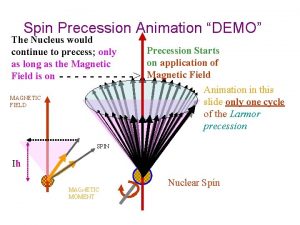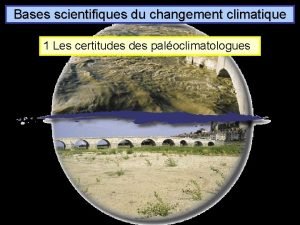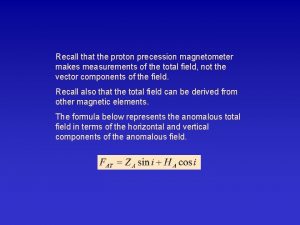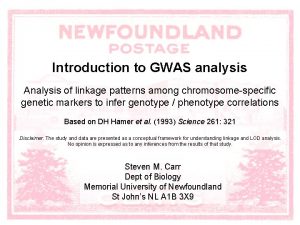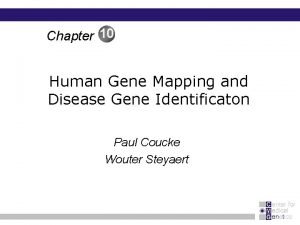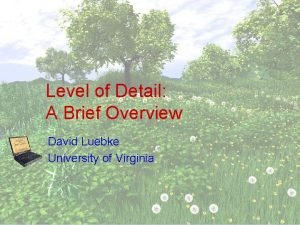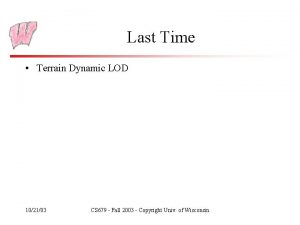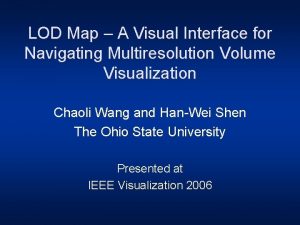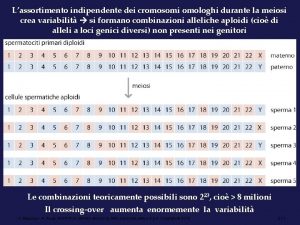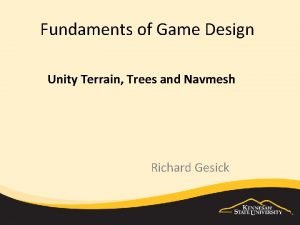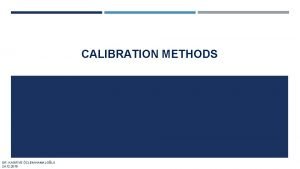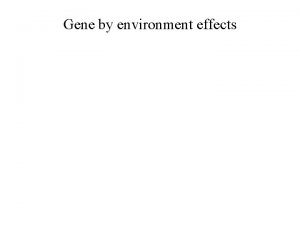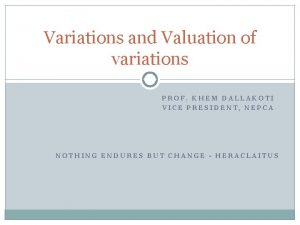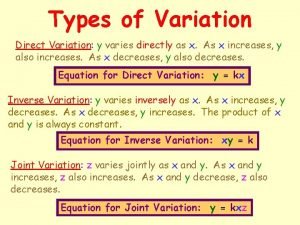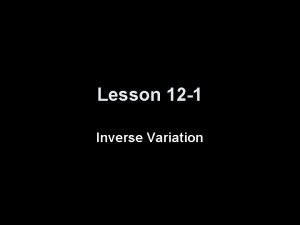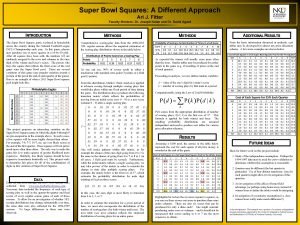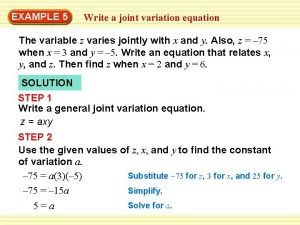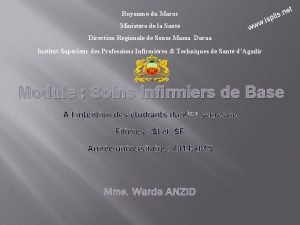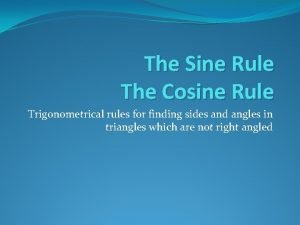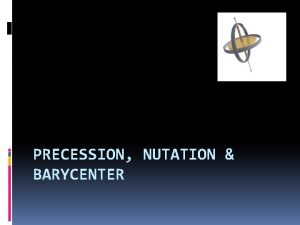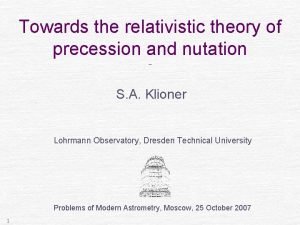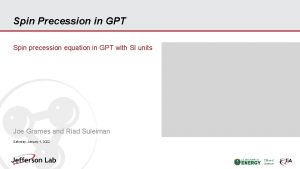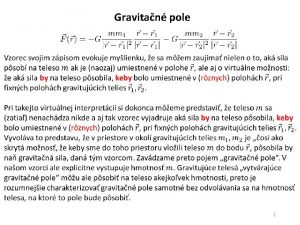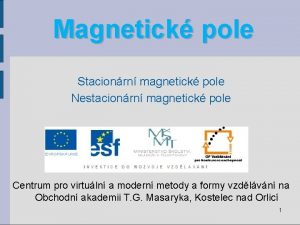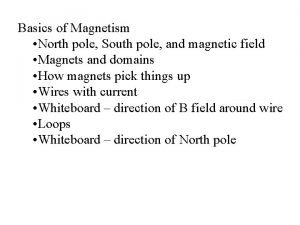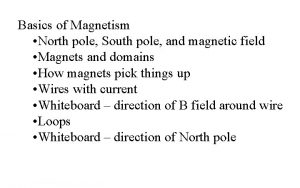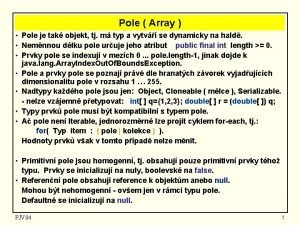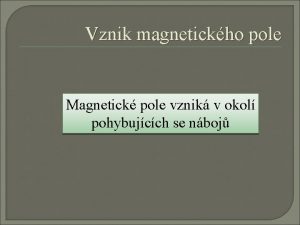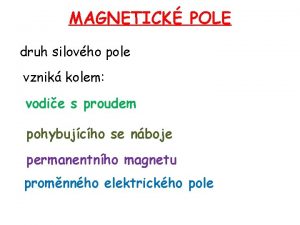Precession nutation pole motion and variations of LOD






































- Slides: 38

Precession, nutation, pole motion and variations of LOD of the Earth and the Moon Yuri Barkin, Hideo Hanada, Misha Barkin Sternberg Astronomical Institute, Moscow, Russia. E-mail: barkin@inbox. ru; National Astronomical Observatory of Japan, Mizusawa, Japan; Bauman Moscow Technical University, Moscow, Russia.

A schematic model of the Earth's mass with variable geometry Gravitational attractions of planet Lunar-solar tides post -glac ial re boun d Volcanos continental waters ocean currents Winds retreat Atmospheric pressure melting ice oceanic load

Geometry and dynamical sense of Andoyer variables - canonical Andoyer variables 2 - the projection of the angular momentum vector on the axis of inertia of the planet - the projection of the angular momentum vector on the fixed axis Z

The equations of motion tasks in The Earth canonical Andoyer’s variables Venus Mars Asteroids Andoyer’s plane Base plane First integrals of Euler - Liouville problem - the constancy of the vector the angular momentum of the rotational motion 3

Earth’s model with slightly variable geometry masses Expressions of the second harmonic coefficients of the geopotential via centrifugal and axial moments of inertia The small temporal variations of the coefficients of the geopotential 4

The Earth with variable geometry of masses Annual and semi-annual variation coefficients of the second harmonic of the geopotential (Moore et al, 2005) 5

Annual, semi-annual variations of coefficients of the second harmonic of the geopotential 6

The unperturbed circular Chandler polar motion of the Earth constant angle 0” 25 The classic approach (astrometry) New theory of the Earth's rotation Andoyer’s plane Base plane The trajectory of the north pole of the The conical motion of the axis of inertia Earth between 1990 - 1996. 1 unit = 3 m. in unperturbed Chandler motion (with a period of 432 days). 8

Secular variation of the geometry of the mass of the Earth and their impact on the variation coefficients of the geopotential and the rotation of the Earth The Earth Venus Mars Asteroids Andoyer’s plane Base plane 20

Explanation of the secular drift of the poles of the Earth Model: Theory: Observations: Found values are agree well with the values obtained from observations (Vondrak, 1999). 22

Trend a observed secular drift of poles of the Earth -0. 15 1906 M=8. 8 (1) Greenwich -0. 10 -0. 05 1940 1920 1960 1970 0. 00 1960 M=9. 5 1980 1990 1950 2000 0. 05 (2) 2010 M=8. 8 0. 10 0. 40 23 1910 1930 0. 35 2010 0. 30 0. 25 0. 20 0. 15 0. 10 0. 05 0. 00 -0. 05

The internal structure of the Earth and the Moon

The rotation of the Earth with liquid core. Work content. A theory of rotation of the non-sphericity of the Earth with an elastic mantle, variable outer shell and a liquid ellipsoidal core in the gravitational field of the moon and sun. As unperturbed rotational motion of the Earth taken not axial and conical motion axisymmetric Earth with respect to the angular momentum of the rotational motion. As the base we used the equation of motion in variables Andoyer. Taken into account the second harmonic of the power function for high-precision description of the orbital motion of the Earth and the Moon. An approximate solution of the problem of the rotation of the Earth is constructed using Construct the table of precession, nutation oscillations pole axis of rotation Earth and others. The good agreement between theory and previously built theories of the Earth's rotation (Kinoshita, 1977; Getino, Ferrandiz, 2001, and others) method of small parameter, Andoyer’s variables, as well as projections the angular velocity of the Earth and its core. It is assumed that the core is an ideal fluid undergoing a simple motion of the Poincare. Construct the table of precession, nutation oscillations pole axis of rotation Earth and others. The good agreement between theory and previously built theories of the Earth's rotation (Kinoshita, 1977; Getino, Ferrandiz, 2001, and others. )

The main shells of the Earth and the Moon The Earth system The Moon system -Mantle - Liquid core - Rigid core In this paper, we consider the two-layer model of the Earth and Moon: nonsphericity solid mantle and liquid ellipsoidal core. Objective: To construct an analytic theory of rotation of the Earth (and Moon).

The two-layer model of theory of the Earth's rotation The Earth The Moon mantle core Euler variables Andoyer’s variables Applications to theory of the Earth rotation Sasao, Ocubo, Saito (1980) Sevilla, Romero (1987) Getino, Ferrandiz (1991 -2001) Ferrandiz, Barkin (2000, 2001) Variables of the Moon physical librations

The Moon three-layer system The Earth The dynamical ellipticities: The Moon

Andoyer’s variables The projections of the angular velocity

Andoyer - Poincare variables ,

The equations of rotational motion of the Earth in Andoyer’s variables - Poincare Hamiltonian of problem Kinetic energy

The equations of rotation of the solid Earth Andoyer variables. The unperturbed rotational motion of the Earth.

The overall structure of the expansion of the force function Киношита часть (1977) N. Rambaux, H. Kinoshita, Yu. Barkin Новые слагаемые разложения Meeting at NAOJ in Mitaka (Tokyo, May 2013)

Kudryavtsev S. M. (2007) Astronomy & Astrophysics Long - term harmonic development of lunar ephemeris Barkin, Kudryavtsev, Barkin, 2009 Kinoshita, 1977, Earth rotation theory Баркин, 1989, Теория вращения Луны

General structure of solution of the problem about the Moon physical librations frequencies of free oscillations of the Moon

Construction of the second harmonic expansions the gravitational potential of the Earth Developments of functions of spherical coordinates of the Moon

The perturbations of the first order in the rotational motion of the Earth in variables Andoyer.

The perturbations of the first order. Variable The module of the angular momentum of the rotational movement of the Earth. , The parameters of the Earth. Note that these formulas generalize similar formulas Kinoshita. Here the angle theta is small, but not zero.

Special functions of angles of nutations . . .

Main results The new theory of libration of the Moon with elastic mantle and with ellipsoidal liquid core have been developed with two different approaches. Determination and explanation of the fourth mode of free physical libration of the Moon caused by the ellipsoidal liquid core.

Barkin Y. , Hanada H. , Ferrandiz J. , Matsumoto K. , Jin S. , Barkin M. (2014) The theory of the physical libration of the Moon with a liquid core. Chapter 13. Taylor & Francis/CRC, USA. pp. 315 -376.

Taylor & Francis/CRC, USA.

Trajectory of the pole of angular velocity of the Moon in its free libration in projection on the lunar surface Mean radius of the Moon 1737. 15 +/- 0. 01 km (Araki et al. , 2010) Direct pole motion To the Earth x Eccentricity of trajectory 1 unit=1 arcs Y

The trajectory of the end of the angular momentum vector projected onto the plane of the ecliptic with the free librations 2028 Cassini’s node X 1 unit =1 arcs 2000 Y

Space trajectory of the end of the angular momentum vector of the Moon in its free librations with respect to ecliptic reference system XYZ connected with moving mean node of orbit Z 2012 2000 1 u nit =1 Y ar cs X

Effects of the ellipsoidal liquid core in duration of lunar day Forced variations of the LOD (of duration of day in seconds of time) of the Moon for model with ellipsoidal liquid core and without core and their difference:

New terms of forced librations in longitude with very big period 183. 564338 years and amplitude 211” 45 Table 1. Periods and amplitudes of variations of the variable in analytical theories Mizusawa, Moons and empirical theory of Rambaux-Williams. № 22 Mizusawa 1 -3 2 -3 -67048, 710 Moons Mizusawa -211, 452 --- In ideal variant its well to confirm (or not) this big term with big period in 183. 564338 years (and some others) directly, with using data of observations. Theory of physical libration of the Moon is needed in development ---

1. Development of forced libration of the Moon for its models with a liquid core. 2. Development of the analytical theory of the rotation of the three-layer model of the Moon and the Earth A. On the base Prof. Getino, Prof/ Ferrandiz model (for the Earth) B. On the base of Prof. Vilke model (for planet)

Two approaches to construction a theory of rotation of the Moon and the Earth as three layered celestial bodies The main area of research involves the development of the analytical theory of the physical libration of the Moon with an elastic mantle and a liquid core and a solid core and a full account of the gravitational perturbation factors exerted by the Earth, the Sun and the major planets (Venus, Mars, Jupiter, Saturn, Neptune, Uranus ). In connection with the installation of the telescope on the lunar surface for precise determination of the parameters of orientation and rotation of the Moon (the predicted accuracy is about 0. 001'') requirements increase to theories of the physical libration of To solve these problems, to determine the parameters of the Moon free libration (4 and 5 modes, etc. ) due to liquid or solid core requires new dynamical studies of the perturbed rotational motion of the Moon based on its current two-and three layers models.

 Nutation
Nutation Nutation
Nutation Difference between lap winding and wave winding
Difference between lap winding and wave winding Define north pole and south pole
Define north pole and south pole Aimant pole nord pole sud
Aimant pole nord pole sud Precession milankovitch cycles
Precession milankovitch cycles Electron spin animation
Electron spin animation Larmor frequency formula
Larmor frequency formula Planes fly in which layer
Planes fly in which layer Précession des équinoxes animation
Précession des équinoxes animation Proton precession magnetometer
Proton precession magnetometer Difference between lod and sti in cmos
Difference between lod and sti in cmos How to calculate lod score
How to calculate lod score How to calculate lod score
How to calculate lod score David luebke
David luebke Dynamic lod
Dynamic lod Lod loq lol
Lod loq lol Spanmb
Spanmb Lod
Lod Lod map
Lod map Lod
Lod Unity terrain lod
Unity terrain lod Lod
Lod Lod
Lod Mne zabloudilou loď
Mne zabloudilou loď Lod score
Lod score Spec rating formula in computer organization
Spec rating formula in computer organization Transistor biasing and thermal stabilization
Transistor biasing and thermal stabilization Valuation of variations
Valuation of variations Types of direct variation
Types of direct variation How do we identify problems involving inverse
How do we identify problems involving inverse Kwhl chart
Kwhl chart Cultural variations in attachment evaluation
Cultural variations in attachment evaluation Super bowl squares variations
Super bowl squares variations What is joint variation
What is joint variation Variations pathologiques de la température
Variations pathologiques de la température Variations in psychological attributes
Variations in psychological attributes Sine rule example
Sine rule example Variations de stock
Variations de stock

